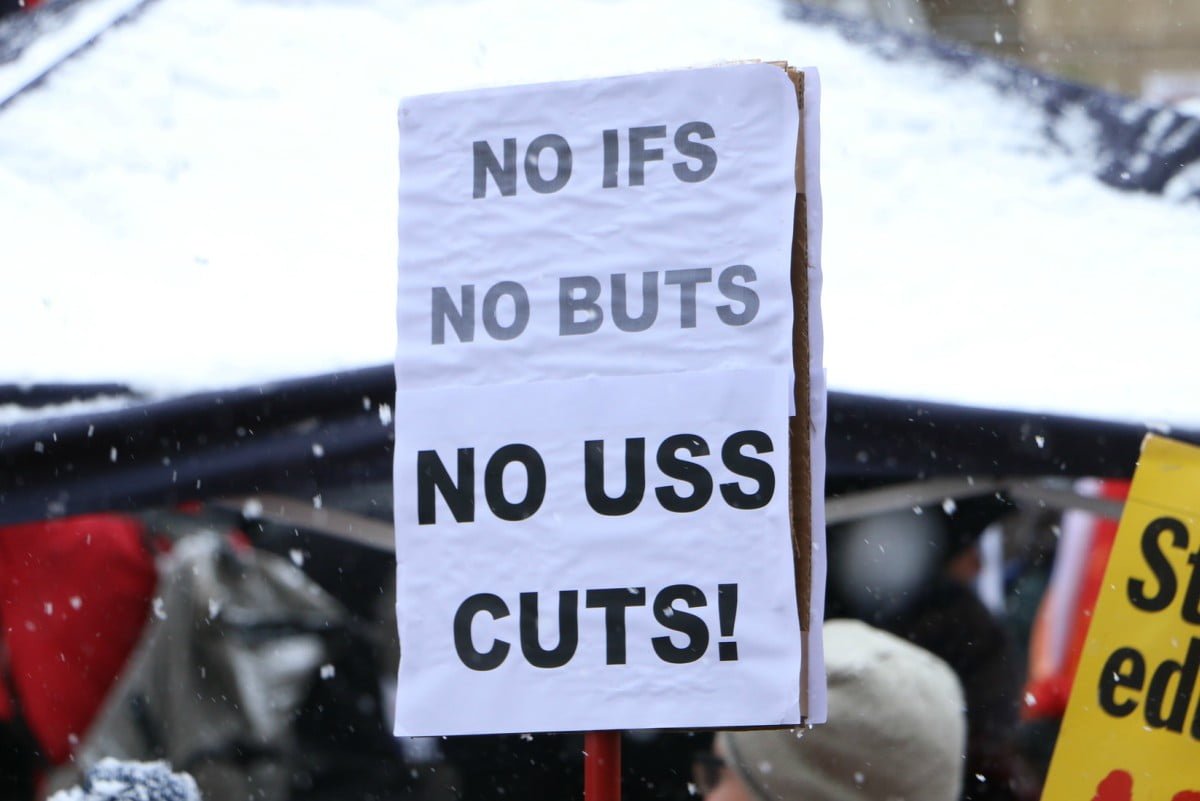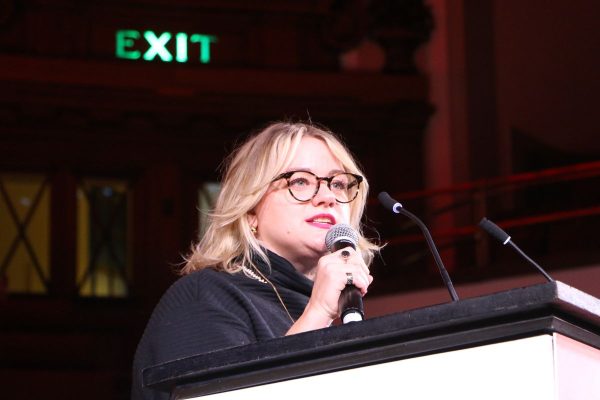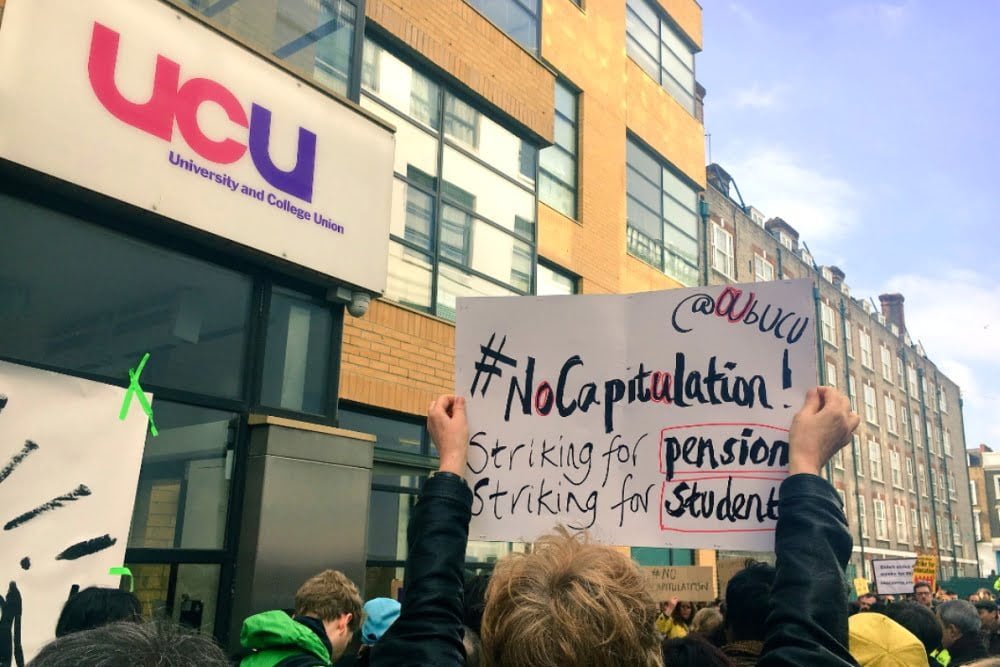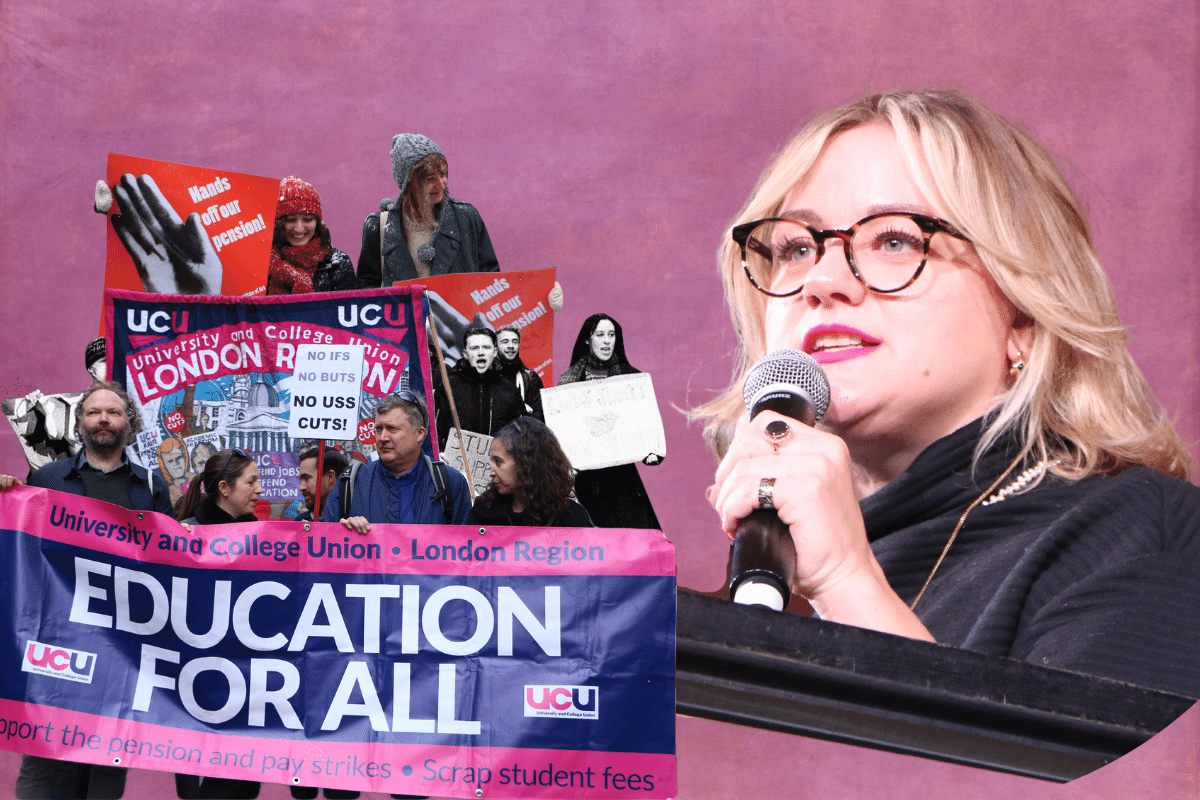Last Friday evening (17 February), announcing that “significant progress” had been made in talks with the employers, UCU general secretary Jo Grady unilaterally called off the union’s next two weeks of scheduled strike action.
Despite the incredibly short notice, with strike days due to continue from today (21 February), members were told they now had to head back into work to ensure a “constructive environment” for negotiations.
This decision to “pause” was made completely undemocratically. There was no input from any members, nor from our union’s elected Higher Education Committee (HEC) or negotiators. All these bodies were bypassed by Grady.
This has understandably provoked enormous anger amongst the union’s rank and file. In a repeat of members’ reaction to the attempted sellout of 2018, the #NoCapitulation hashtag has been revived by UCU members across social media.
Similarly, a demo took place outside UCU HQ last night (20 February) to demand #NoCapitulation. Outrageously, union management took the decision to close their office early in order to avoid facing rightfully angry members.
Rank-and-file UCU members outside union HQ demanding strike action is restarted, after the union bureaucracy called a two week pause to strike action with no deal on the table. Build power in the workplace, win the reballot, strike until we win! pic.twitter.com/S95944BCxD
— Notes from Below (@NotesFrom_Below) February 20, 2023
‘Offer’

It is clear the ‘offer’ on the table is wafer-thin, designed to sound good enough to get the UCU to backtrack just as we reach the height of our latest 18 days of action.
Let’s look at what is actually being proposed. On pay, the joint statement agreed by UCEA (the employers’ representatives) and the unions involved in negotiations states in the first paragraph that discussions are at “an impasse, rather than an agreement”.
Indeed, there is no movement beyond the previous pay offer from UCEA of between 5% and 8% – a real-terms wage cut. In other words, pay is at a stalemate.
“80% of us said no!” stated Callum Cant of The University Worker bulletin in a speech at Monday evening’s emergency demo, referring to a consultative poll that took place at the start of the month. “And yet now, with no improvement on the deal, we’re out here with the strikes having been called off, because apparently we’ve made great progress!”
“I can’t see the logic in that,” Callum continued. “Rank-and-file members around the country can’t see the logic in that.”
Splintering

On casualisation, Grady also tells us we are on our way to ending zero-hour contracts and casualisation. Yet the joint statement only says UCEA will consult its members to make a “positive recommendation to take action on zero-hours contracts”. To be clear: taking action does not mean ending.
It then goes on to emphasise that there will be “specifically defined reasons” for “employment arrangements without fixed or minimum hours”, with those reasons to be agreed between individual institutions and local unions.
There you have the nub of it. Zero-hour and fixed-term contracts will continue where the bosses decide that they are appropriate locally. This lays the basis for splintering our collective struggle into 150 local disputes over “appropriate” levels of casualisation.
Demands around pay gaps and workloads, meanwhile, only have the guarantee of further negotiations. And we have a vague reference to restoring pensions, but with no promise or even indication that they will actually do so.
Undemocratic
So without a single, concrete concession, the general secretary has called off our action mid-negotiation. This is a tactical blunder of the highest order.
The only reason that there was any movement in negotiations is thanks to the determined strike action that members have taken. But Grady’s move will now take the wind out of the sails of thousands of members, just as momentum was building.
Many have pointed out that Grady herself made this same point back in 2018, when our previous general secretary attempted the same kind of manoeuvre from above to call off strikes.
In a tweet from February 2018, Grady said: “Continuing action during ACAS is not only the right move, but a clear signal from UCU that they are not backing down.”
Yes 2018 Jo Grady, I completely agree! We dont call off strikes until we have a concrete offer! You tell 2023 Jo Grady! #ucuRISING https://t.co/lSC2s5LcF2
— Sam Morecroft 4 UCU NEC (@SamMorecroft) February 17, 2023
Of course, leaders sometimes have to make quick decisions. In this case, however, it was completely possible to put this decision to the vote amongst members. And even then, such a vote should be over a negotiated deal, not hollow promises and platitudes from the bosses.
#NoCapitulation

Since the union leadership is proving unable to lead this strike, the rank and file must make their voices heard.
Similar #NoCapitulation protests should be called locally, in order to keep the pressure on our leadership to resume the fight.
Branches should also call emergency meetings ASAP to pass motions against Grady’s pause, and to discuss the way forward for our struggle.
And if full-time UCU officials continue down this same path of bureaucratic manoeuvring, in a scandalous attempt to circumvent the proper democratic channels, then members should demand a special rank-and-file conference to decide upon the future direction of our disputes, our union, and our sector.
We cannot let this episode disrupt the reballot that is set to begin this week. We have to make clear – to UCU leaders and university bosses alike – that members still want to continue the fight for an education system that is run in the interests of staff and students, and not for the profits of the few.
We say:
- Respect union democracy!
- #NoCapitulation!
- Put the rank and file in control!
Democracy in our union: A burning question
Elena Simon, University of Sheffield UCU (personal capacity)
The following article was written prior to Jo Grady’s recent manoeuvres. Appearing in the latest bulletin of the UCU Marxists, it addresses many of the important concerns surrounding democracy and transparency inside the union that have been raised by rank-and-file members over the past week.
Jo Grady’s campaign to become UCU general secretary (GS) back in 2019 was welcomed as a rebellion against a stale bureaucracy overseen by Sally Hunt, who had been in the post since the first GS elections in 2007.
Grady’s critique of her predecessor’s sellout deal, alongside her support for grassroots voices, seemed to mark a new era of member engagement within the union, emerging from the struggle.
She promised greater democracy in the union, gaining a big echo. And her election was the first time in the history of the union that a grassroots member has been elected as GS.
Now, four years into her term, and no closer to winning either of the long-running disputes (on pay and conditions or pensions), we must draw some lessons from Grady’s time in office.
Specifically, has democracy within the union improved under her leadership?
Commission

Initially, in Grady’s first year as UCU leader, a democracy commission was tasked with identifying potential rule changes that would hand rank-and-file members more decision-making power, especially during the course of disputes.
Over the course of a year, this commission worked out a detailed plan of suggestions to put forward to a special congress.
This included: a national disputes committee to direct the course that disputes take, made up of delegates from each branch; limiting the term of the GS to three (instead of five) years; and introducing a right to recall elected officials, including the GS, which was widely supported following Hunt’s shenanigans.
These measures represented concrete steps to place more control in the hands of rank-and-file members.
The 2019 special congress called to discuss the recommendations, however, ended in chaos. Two-thirds of the motions were not heard, and significant motions – like that pertaining to the disputes committee – were defeated.
Legal advice sought by the union claimed that the commission was casualising the position of the GS. This led to the termination of the commission altogether.
Pandemic
Then, during the pandemic, democracy within the union took a complete backseat.
Of course, this was an unprecedented time. But this was precisely when members needed their union the most, in order to come together and fight for safe conditions.
Indeed, at a local level, branches up and down the country used video-calling platforms successfully. Meanwhile, sister unions (such as the NEU) spearheaded national mass Zoom meetings, which organised resistance against unsafe conditions in schools during the pandemic.
But national UCU meetings, including congress, were postponed – allegedly due to safety concerns over widely available video-calling platforms.
And when online meetings were introduced in the UCU during the lockdown, congress time was reduced by half. Free discussion and debate was hindered, meanwhile, with rules put in place to ensure an even number of pre-registered ‘for’ and ‘against’ contributions on every motion.
Mirage

Instead of genuine discussion, the union has also seen an increase in member surveys, questionnaires, and Q&A sessions on YouTube.
This is all with the apparent goal of greater rank-and-file say, and to provide a voice for members. But this is just a mirage.
All of this culminated recently in the now-infamous Twitter stream at the beginning of this year, in which Grady publicly went against the democratic decision of the Higher Education Committee (HEC), whilst also publicly sharing details of the union’s fighting fund.
Taking these debates onto social media seeks to imply that the union’s elected bodies are not representative of the membership. Furthermore, it also presumes that the GS speaks on behalf of a ‘silent majority’.
Twitter and other social media platforms have their use. They can certainly play a role in amplifying the coverage of strikes and campaigns. But they are not a useful tool – or a substitute – for democratic discussion over the course that an active strike should take.
Control

These episodes illustrate a consistent tendency towards a bureaucratic sidestepping of democracy. This actively harms the ability of the union to win its disputes. And it leads to division precisely at a time when unity is most required.
Ultimately, we need strong rank-and-file democracy, in which members collectively express their views and decide on what direction to take their disputes. This must go hand-in-hand with bold leadership, to win for members.
Grassroots members should have a greater say over the disputes they want to fight and are sacrificing for. This means establishing strike committees during disputes, such as the ones we are currently fighting – elected at a local level, and linked up nationally, to ensure direct control over the struggle.
We also need to ensure that our union leadership is accountable. This is why the right not only to elect but to also recall elected officials is vital, including for the general secretary. Furthermore, these representatives should be on the same average wage as their members, to ensure that their interests are truly aligned.
Union democracy is not a secondary question. It is vital for a fighting union that truly reflects the will of its members.






